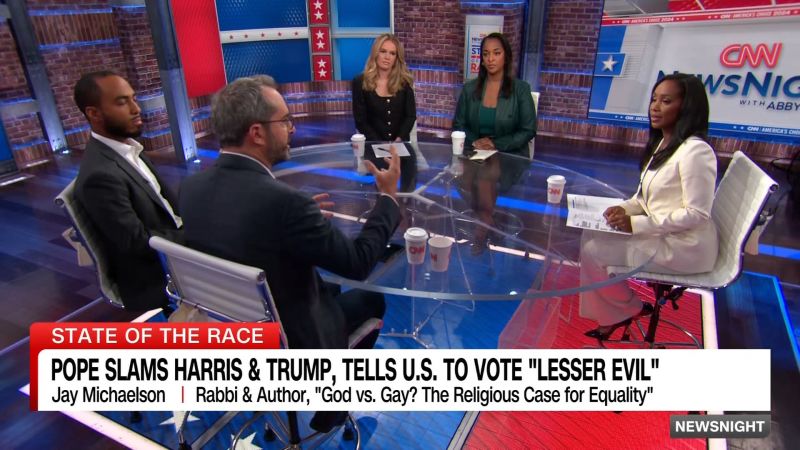During a recent interview, Pope Francis expressed his thoughts on the upcoming U.S. election, describing it as a choice between the “lesser of two evils” when it comes to candidates Donald Trump and Kamala Harris. This statement has prompted speculation about the potential impact of the Pope’s comments on voters as they consider their choices in the election. While the Pope does not have the power to directly influence the outcome of the election, his words carry weight with many people around the world, including American voters. His comments may prompt some voters to reassess their views on the candidates and consider the moral implications of their choices.
The Pope’s characterization of the election as a choice between two flawed candidates reflects a common sentiment among voters who may feel disillusioned by the options available to them. Many voters struggle with feeling like they are choosing between the “lesser of two evils” rather than candidates who truly represent their values and beliefs. The Pope’s comments highlight the complexity of the decision facing voters and may serve as a reminder to consider the larger implications of their choices. By framing the election in this way, Pope Francis is encouraging voters to think critically about the candidates and the impact of their decisions on society as a whole.
With his status as the leader of the Catholic Church, Pope Francis wields significant influence over the opinions and beliefs of millions of followers worldwide. His comments on political issues have the potential to shape public discourse and provoke reflection among his followers. While the Pope’s remarks on the U.S. election may not directly sway the outcome, they may lead some voters to reconsider their perspectives and priorities when choosing a candidate. The Pope’s intervention in the political sphere serves as a reminder of the moral dimensions of political decision-making and the importance of upholding ethical principles in the voting process.
The Pope’s remarks on the election underscore the broader conversation about the role of religion in politics and the intersection of moral values with political decision-making. His comments raise questions about how religious leaders should engage with political issues and the extent to which they should influence the beliefs and actions of their followers. While the Pope’s interventions may be seen as an attempt to guide voters towards making moral choices, they also spark debate about the separation of church and state and the boundaries of religious influence in public affairs. The Pope’s comments on the election prompt reflection on the ethical responsibilities of voters and the need to consider the moral implications of political decisions.
The Pope’s characterization of the election as a choice between the “lesser of two evils” challenges voters to confront the complexities of the political landscape and the challenges of making ethical decisions in a flawed system. His comments may push voters to think beyond the personalities of the candidates and consider the broader implications of their policies and platforms. By framing the election in this way, Pope Francis is urging voters to prioritize moral values and principles in their decision-making process and to consider the impact of their choices on the common good. The Pope’s intervention in the election serves as a call to voters to engage in a thoughtful and discerning evaluation of the candidates and their platforms, taking into account the moral imperatives that should guide their choices.
Ultimately, Pope Francis’s comments on the U.S. election underscore the importance of ethical considerations in the political process and the need for voters to critically assess the choices before them. While the Pope’s remarks may not directly influence the outcome of the election, they have the potential to prompt reflection and dialogue among voters as they consider the moral dimensions of their decision-making. By challenging voters to think beyond partisan allegiances and personal preferences, Pope Francis encourages a more thoughtful and principled approach to the electoral process. His intervention in the election serves as a reminder of the moral imperatives that should underpin political decision-making and the responsibilities of voters to uphold ethical principles in choosing their leaders.


